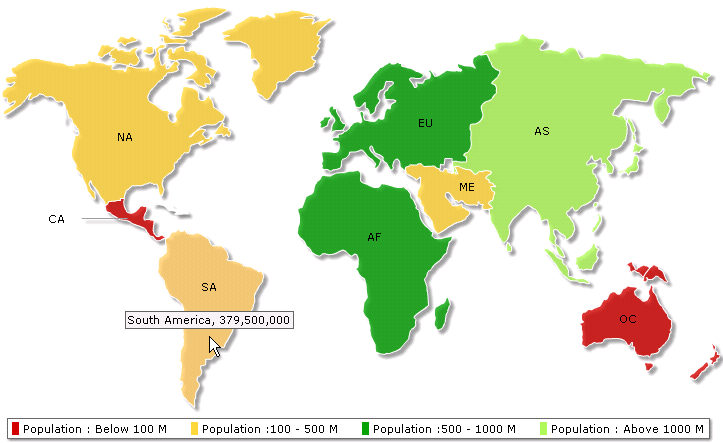Let's look at the codes used in Map Container Page and Data Provider Page one by one.
<%@ Page Language="C#" AutoEventWireup="true" CodeFile="BasicArrayURL.aspx.cs" Inherits="BasicArrayExample_DataURL" %>
<html>
<head>
<title>FusionMaps XT Sample - Basic Example from array - Using Data URL</title>
<script language="Javascript" src="../Maps/FusionCharts.js"></script>
</head>
<body>
<form id='form1' name='form1' method='post' runat="server">
<% //Generate World Map in WorldPopulationMap Literal Control %>
<asp:Literal ID="WorldPopulationMap" runat="server" />
</form>
</body>
</html>
using System;
using System.Data;
using System.Configuration;
using System.Collections;
using System.Web;
using System.Web.Security;
using System.Web.UI;
using System.Web.UI.WebControls;
using System.Web.UI.WebControls.WebParts;
using System.Web.UI.HtmlControls;
// Using FusionCharts.dll
using InfoSoftGlobal;
public partial class BasicArrayExample_DataURL : System.Web.UI.Page
{
///<summary>This Function will Help to Generate US Map.</summary>
protected void Page_Load(object sender, EventArgs e)
{
// Define Data URL
string DataURL;
// Data URL that will relay Map XML
DataURL = "WorldPopulationData.aspx";
// Create the Map with data contained in Data URL
// and Return HTML output that embeds the Map
// We use FusionCharts class of InfoSoftGlobal namespace (FusionCharts.dll in BIN folder)
// RenderChart() generates the necessary HTML needed to render the map
string mapHTML= FusionCharts.RenderChart("../Maps/FCMap_World8.swf", DataURL, "", "mapid", "600", "400", false, false);
//embed the map rendered as HTML into Literal - WorldPopulationMap
WorldPopulationMap.Text = mapHTML;
}
}
- We include InfosoftGlobal assembly which will help embed the map easily
- We declare a variable, DataURL that contains the name of the Data Provider Page (WorldPopulationData.aspx)
- We pass DataURL to RenderChart() function provided by the FusionCharts class of InfosoftGlobal assembly
- The XML is relayed and finally map is rendered in literal - WorldPopulationMap.
<%@ Page Language="C#" %>
<script runat="server">
// This Page will Generate Map XML when it's called as DataURL
protected void Page_Load(Object sender, System.EventArgs e)
{
// Declare array entity to store world population
// We use world map with 8 entities/continents
// this 2 dimensional array will store 8 rows of data for each continent of the map
// first column of each row will store the Internal Id of each entity on the map
// second column will store population data of each entity
string[,] dataArray = new string[8, 2];
dataArray[0, 0] = "01";
dataArray[0, 1] = "3779000000";
dataArray[1, 0] = "02";
dataArray[1, 1] = "727000000";
dataArray[2, 0] = "03";
dataArray[2, 1] = "877500000";
dataArray[3, 0] = "04";
dataArray[3, 1] = "421500000";
dataArray[4, 0] = "05";
dataArray[4, 1] = "379500000";
dataArray[5, 0] = "06";
dataArray[5, 1] = "80200000";
dataArray[6, 0] = "07";
dataArray[6, 1] = "32000000";
dataArray[7, 0] = "08";
dataArray[7, 1] = "179000000";
// Now, we need to convert this data into XML.
// We convert using string concatenation.
// Declare strXML to store Data URL of the map
StringBuilder strXML = new StringBuilder();
// Initialize <map> element
strXML.Append("<map showLabels='1' includeNameInLabels='1' borderColor='FFFFFF' fillAlpha='80' showBevel='0' legendPosition='Bottom' >");
// Set Color ranges : 4 color ranges for population ranges
strXML.Append("<colorRange>");
strXML.Append("<color minValue='0' maxValue='100000000' displayValue='Population : Below 100 M' color='CC0001' />");
strXML.Append("<color minValue='100000000' maxValue='500000000' displayValue='Population :100 - 500 M' color='DDD33A' />");
strXML.Append("<color minValue='500000000' maxValue='1000000000' displayValue='Population :500 - 1000 M' color='069F06' />");
strXML.Append("<color minValue='1000000000' maxValue='5000000000' displayValue='Population : Above 1000 M' color='ABF456' />");
strXML.Append("</colorRange>");
// Open data element that will store map data
strXML.Append("<data>");
// Use Data from array for each entity
for (int i = 0; i < dataArray.GetLength(0); i++)
{
// Set each map <entity> id and value
strXML.AppendFormat("<entity id='{0}' value='{1}' />", dataArray[i, 0], dataArray[i, 1]);
}
// close data element
strXML.Append("</data>");
// close map element
strXML.Append("</map>");
// Set Proper output content-type
Response.ContentType = "text/xml";
// Just write out the XML data
// NOTE THAT THIS PAGE DOESN'T CONTAIN ANY HTML TAG, WHATSOEVER
Response.Write(strXML.ToString());
}
</script>
- We declare a 2-dimensional array, dataArray, to store the population data and Internal IDs for 8 continents.
- We store data in the array, the first column is used to store Internal IDs and the second column stores the population value of respective continents.
- Then we declare a variable strXML to store the XML of this map.
- After declaring the variable we set 4 color ranges to the strXML.
- Then we store the data from the dataArray to strXML by iterating through dataArray.
- Finally, we send this data to output stream without any HTML tags.
